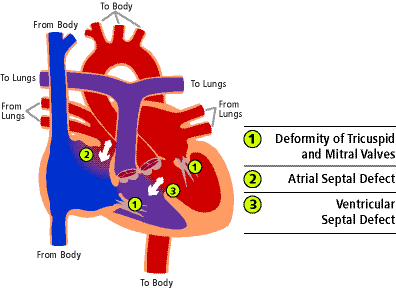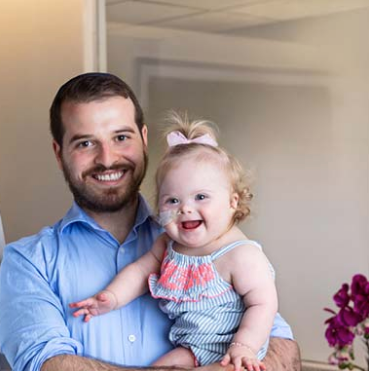What you need to know about ASVD
Contents
Atrioventricular septal defect (AVSD) or AV Canal is a congenital (present at birth) heart defect that occurs when there is a hole between chambers of the heart and problems with the valves regulating blood flow in the heart. It allows extra blood to flow to the lungs, forcing the heart to overwork. This can cause the heart muscle to enlarge. AVSD can involve all four-chambers of the heart (complete) or only the two upper chambers (partial).
If left untreated, AVSD can cause high blood pressure in the lungs and heart failure. Surgery is generally recommended by doctors during the first year of life to close the hole in the heart and reconstruct the valves. If possible, surgery is delayed until the baby is about 4 to 6 months of age to lower the risks of the surgery. In this case, medicines can be used to control symptoms and ensure adequate weight gain while waiting for surgery.

What does the Procedure Involve?
Medical management
If surgery is delayed, the goal of treatment before surgery is to ensure adequate weight gain and control symptoms of congestive heart failure. Medical management is only a short term measure until your child is strong enough for surgery. With medical management, your child’s doctor may recommend nutritional support from more concentrated breast milk or formula to give the baby more calories. Giving your child medicine, such as furosemide (Lasix) and digoxin (Lanoxin) can help your child’s kidney from removing excess fluid from the lungs and the body.
Angiotensin-converting enzyme (ACE inhibitors), such as Enalapril and Captopril can also be used to help your child’s heart to pump blood forward into the body digoxin. It can also strengthen the heart so that it can pump more efficiently.
Surgery
Surgery is required for both partial and complete AVSD. Surgery for AVSD is performed through open-heart surgery, meaning the heart will need to be stopped and opened. Surgery involves closing any hole in the wall (septum) between the heart chambers with patches. These patches can stay in the heart permanently. As the heart’s lining grows over the patches, they become part of the septum.
For partial AVSD, the surgeon will also repair the mitral valve during the procedure to make it close tightly. If the mitral valve cannot be repaired, the surgeon may need to replace it.
For complete AVSD, the surgeon will separate the common valve into two distinct valves – one on the left and one on the right side of the repaired septum. If the single valve cannot be separated, the surgeon will perform heart valve replacement of both the mitral and tricuspid valves.
How Long Should I Stay at my Destination?
Your child may need to stay in the intensive care unit for 2 to 4 days after surgery and then stay in a regular hospital room for 5 to 7 more days after they leave the ICU. In total, your child needs to stay in the hospital for 7 to 11 days. After your child is discharged from the hospital, you and your child have to stay in the area for about 10 to 14 more days. This period is needed to ensure your child is strong enough to fly home. Also, the doctor will schedule follow-up checkups to evaluate your child’s recovery.
What’s the Recovery Time?
If your child does not have other heart problems, it may take about 3 to 4 weeks for them to completely recover after surgery. In some cases, it may take 6 to 8 weeks until your child can be back to their usual behavior. Their doctor will let you know about the exact recovery time.
What About Aftercare?
Before you and your child leave the hospital, the medical team will tell you how to care for your child. The instructions may include:
-
A nutritional program to encourage weight gain
-
Wound care while the baby is healing
-
An oral hygiene program to prevent infection
-
An exercise regimen to achieve fitness and build body mass.
Lifelong follow-up care with a cardiologist who is trained specifically in congenital heart disease is required after AVSD treatment. Your child’s doctor may also suggest a follow-up examination once a year, or sometimes more if problems remain. In addition, your child may have to take preventative antibiotics before certain dental or surgical procedures if, during AVSD treatment, they received an artificial heart valve, received artificial material, or has remaining heart defects.
What’s the Success Rate?
AVSD treatment is usually very successful and most children do well after surgery. About 95% of patients can do very well without any significant complications after surgery. It is reported that the long-term survival of children with complete AVSD who received treatment is 85% at 5 years, 82% at 10 years, and 75.9% at 15 years.
Although the success rate is high, there are some risks and side effects with the procedure. These include bleeding, infection, embolization to the brain, and problems with the heart rhythm.
Are there Alternatives to AVDS Treatment?
There is no alternative to AVDS treatment. Without proper treatment, AVSD can complicate and become life-threatening. It can lead to heart failure and high blood pressure in the lungs.
What Should You Expect Before and After the Procedure
Before AVSD treatment, your child may experience symptoms that are similar to heart failures, such as fatigue, wheezing, rapid breathing, difficulty breathing, poor weight gain, and excessive sweating. The condition can become dangerous and develop into life-threatening conditions, such as enlargement of the heart and respiratory tract infections. After treatment, your child will likely be able to lead a normal, healthy, and productive life, with no activity restrictions.
For an in-depth analysis of an AVSD Procedure, watch this short video.
To check prices or to book an ASVD Procedure, in Thailand or anywhere else in the world, head on over to MyMediTravel now!

